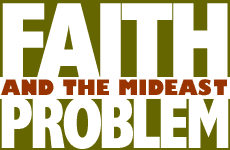 You Know More Hebrew Words Than You Think
You Know More Hebrew Words Than You Think


8 min read
All leaders draw their power from faith. The only question is where that faith is directed. In times of national crisis, that decision is critically important.
Common conception holds that belief in God is generated in the heart of the believer, by virtue of a conviction that God exists. Those who are skeptical of God's existence have no such conviction of faith and thus do not believe in God's existence.
The great 20th century sage, the Chazon Ish, makes a revolutionary point regarding belief in God in his work Emunah v'Bitachon ("Faith and Trust"). He explains that belief in God is a built-in attribute of the human soul, and is not dependent on one's prior convictions.
Life without faith is not an option. Human beings have a built-in need to believe in something that we must fill with some content. The question is not whether to believe or not to believe. We are directed by our own inner natures to invest belief in something. In this, we have no choice at all. Our sole choice is in what we select as the object of our beliefs. Do we believe in God? In angels? In science?
BELIEF AND OPTIMISM
We can bring this down to earth a bit more by distinguishing between belief and optimism.
Optimism is the confidence that I will be able to bring my plan to a successful conclusion. My plan is within my abilities to execute, all things being equal. This simply assumes the continued existence of an ordinary world. (That is, "I won't get sick, there won't be a drought this year, the market won't crash, the Twin Towers won't collapse.)
As the last example illustrates, these assumptions are not always warranted, and at times "other things do not remain equal." But because of the ordinariness of the phenomena that are generally lumped under the heading of "all things," the expectation of their continuance falls under the heading of simple optimism rather than belief.
Belief concerns matters that are beyond my capacity to accomplish even if I assume that all things will remain equal. When applying this concept to the situation of the Jewish people in Israel, we can clearly see that they are presently located in a belief situation where there is little room for simple optimism.
Military prowess has not been sufficient to bequeath the Jews quiet possession of the land.
The Jewish people have tried to secure a firm grip on the Land of Israel through war and through peace. Israel built up its military might until they were secure that they could defeat the Arab nations on the battlefield, as they have repeatedly done since the 1948 War of Independence. However this military prowess was not able to bequeath them quiet possession of the land.
Next, the Jewish people attempted to make peace with the Arab nations by offering painful concessions in land and security and promising the Palestinians their own state. But nor did this path manage to bequeath them quiet possession.
There is, therefore, no room for optimism in such a situation. If all things continue to be equal, Jews will never enjoy quiet possession of Israel. Here is where belief steps in.
BELIEF IN HUMAN DECENCY
There are senior statesmen holding leadership positions in Israel who believe in the innate decency and rationality of all human beings. According to their view, if you speak to people long enough in the voice of reason, if you keep practicing military restraint, if you keep demonstrating that you have the Palestinian best interest at heart as much as you do your own, then the innate reasonableness of the human soul will eventually assert itself. And then, blissfully, quiet possession of whatever is agreed to will be the result.
Within the context of the Chazon Ish's position that all human beings are naturally compelled to invest their belief in something, it is not all that surprising to find intelligent people calling for continued dialogue with Palestinian leader Yasser Arafat.
For if we stop to examine the candidates available for rational investment of belief in regard to political issues, it turns out to be a rather short list. There are really only three options:
Leaving the believers in God out of the discussion for the moment, we find it is very difficult to pick between the remaining two choices.
The voices that call for dialogue with Arafat after a solid year of Palestinian-generated terror and turmoil have this to say to the opposition: "You believe we have already demonstrated that it is impossible to reach peace with the Palestinians by talking. But what is your alternative? We have surely demonstrated that you cannot solve the Palestinian problem through the use of arms either. So what is your plan?"
The opposition's answer, of course, is also based on faith.
Leaders holding the opposing view would rather place their faith in Israel's own ability to somehow overcome all obstacles, rather than in the innate goodness and rationality of all human beings.
Therefore, what we are really watching here is the unfolding of an emunah choice -- between the belief in the decency of all human beings, versus the belief in one's own strength.
The only way to truly believe in the innate goodness of human beings is to also believe in God.
The fascinating aspect here is that the only way to truly believe in the innate goodness of human beings is to also believe in God. Human belief systems tend to one of two extremes. Human beings were either fashioned by God in His image (as the Torah tells us), or they evolved from the higher primates.
It seems the height of absurdity for one who does not accept the Bible story to invest any faith in the innate goodness of human beings. Why would a creature that evolved from apes be inherently benevolent and reasonable?
We can therefore conclude that those who are committed to the belief that all human beings are innately reasonable (and thus it is always possible to reach accommodation through the patient exercise of good will) are in truth committed to the biblical belief of creation as well. In terms of our three options of belief, the belief in man's innate goodness turns out to be an adjunct of the belief in God.
BELIEF IN SELF
Believing in oneself, on the other hand, is a rational alternative to believing in God.
The assumption that man is a product of evolution rests on the concept of the survival of the fittest. If you believe that you are the fittest, which is not a manifestly absurd proposition, there is reason to expect that you will triumph in the end.
In the context of the Israeli situation, it is impossible to stop halfway and believe in man's innate goodness -- without going all the way to an express belief in God. Our adversaries are believers in God, and their political options are directed by what they consider to be His direct orders.
Arafat represents a people who believe in the Koran which claims that God promised Muslims the land. The Muslim Bible repeatedly substitutes Ishmael for Israel at crucial points. Arafat has stated publicly in speeches (conveniently under-reported by a sympathetic media) that he is duty bound to take Israel by force, and any agreement is to be regarded as a temporary expedient, in line with the agreement Mohammed himself entered with the "infidels."
The true Muslim fundamentalists, the base of Arafat's power and whose spokesman he must be to retain his position, believe that they are the "scourge of God" against the unbelievers, and it is their sacred duty to destroy Western civilization and its adherents. Western civilization teaches mankind to invest its faith in the wrong place, and therefore in the eyes of God it is an abomination.
This explains how religious people can engage in horrendous terrorist acts, and this is why there should be no distinction drawn between Bin Laden terrorism and Palestinian terrorism.
Any secular vision based on the innate rationality of man is doomed to failure in the face of such an enemy.
This fundamentalist vision is the belief of our adversaries. Any secular vision based on the innate rationality of man is doomed to failure in the face of such an enemy.
If there is no room for simple optimism, and we must resort to real belief to have any hope of solving our problem, we must also return to the source of our own beliefs. This means investing our capacity to believe directly in the benevolent God who addressed the entire Jewish nation at Mount Sinai.
Our ability to benefit from the power of God generally held by mankind is dependent on the collective belief of the Jewish people. If our leaders -- who still believe in man's innate goodness, a belief that is clearly based on their biblical heritage -- would invest their belief directly in the source, it could sway the entire Jewish nation to follow and return to investing faith in God.
The resultant Divine illumination would spread over the world, uniting mankind under the banner of true belief, and ushering in an era of world peace where all mankind asserts the innate goodness of a being fashioned in God's own image.
